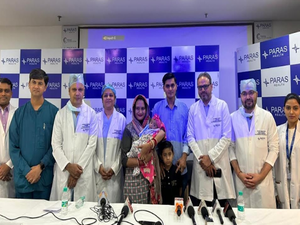Gurugram doctors treat 1-month-old baby with rare congenital heart defect
By IANS | Published: May 1, 2024 06:59 PM2024-05-01T18:59:05+5:302024-05-01T19:00:08+5:30
Gurugram, May 1 Doctors of a Gurugram hospital granted a new lease of life to a one-month-old baby ...

Gurugram doctors treat 1-month-old baby with rare congenital heart defect
Gurugram, May 1 Doctors of a Gurugram hospital granted a new lease of life to a one-month-old baby who suffered from a rare congenital heart defect.
The baby suffered from a Left ventricular (LV) apical aneurysm, a condition where the apical part of the left ventricle of the heart is replaced by fibrous tissue, making it thin and weak, and prone to spontaneous rupture.
The condition is rare, with only 809 cases reported worldwide.
Doctors at Paras Health diagnosed the condition during foetal echocardiography at 26 weeks of pregnancy.
However, the team of doctors planned strict cardiac monitoring and let the baby grow as old as possible before operating, allowing the heart to grow muscles.
The doctors closely monitored the child until delivery to ensure that the size of the aneurysm did not increase. An MRI, following birth, confirmed their diagnosis.
"The parents were advised for close follow-up on medical management; however, after a month, when the size of the aneurysm increased and the child started experiencing breathing difficulties, it was decided to perform the surgery," said Dr. Deepak Thakur, Senior Consultant - Paediatric & Foetal Cardiology, Paras Hospitals, Gurugram.
The complex, six-hour-long surgery, known as Left Ventricular Endoaneurysmorrhaphy, was done when the baby was 1 month weighing 3.4 kg.
While all neonatal and infant cardiac surgeries are inherently complex, the involvement of the left side of the heart added another layer of complexity, said Dr. Shyamveer Singh Khangarot, Consultant - Congenital (Neonatal & Pediatric) Cardiac Surgeon, Paras Health, Gurugram.
"Every millimetre of tissue in the infant's heart was critical, and we had to carefully consider not only the immediate outcome but also the long-term growth potential. After 6 hours of the surgery, the aneurysm was repaired with a composite patch of polyester and pericardium with another layer of epicardium," he added.
The baby required ventilation for 36 hours post-operation, after which the child was discharged within a week, the doctors said.
Disclaimer: This post has been auto-published from an agency feed without any modifications to the text and has not been reviewed by an editor
Open in app